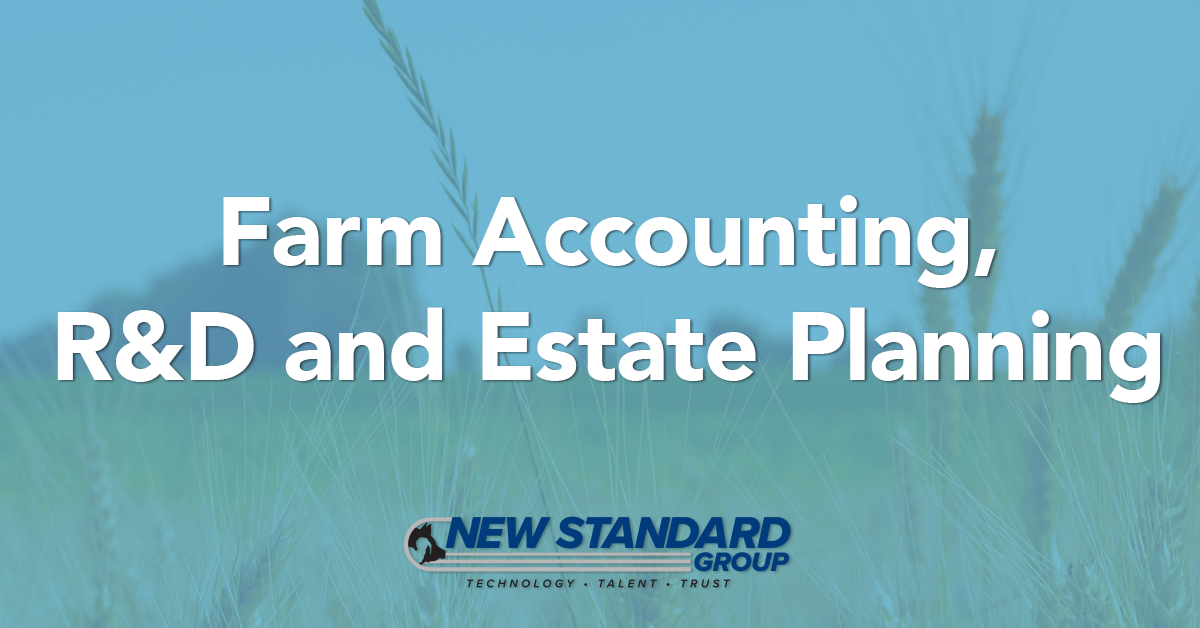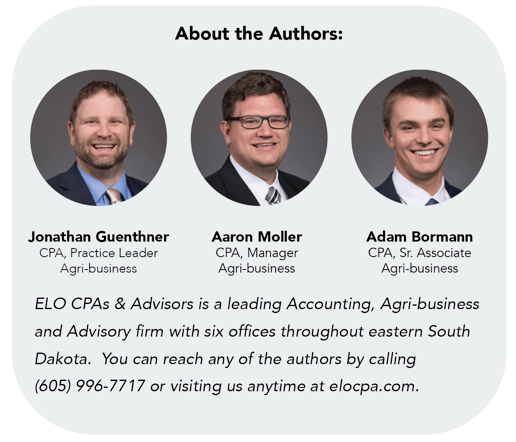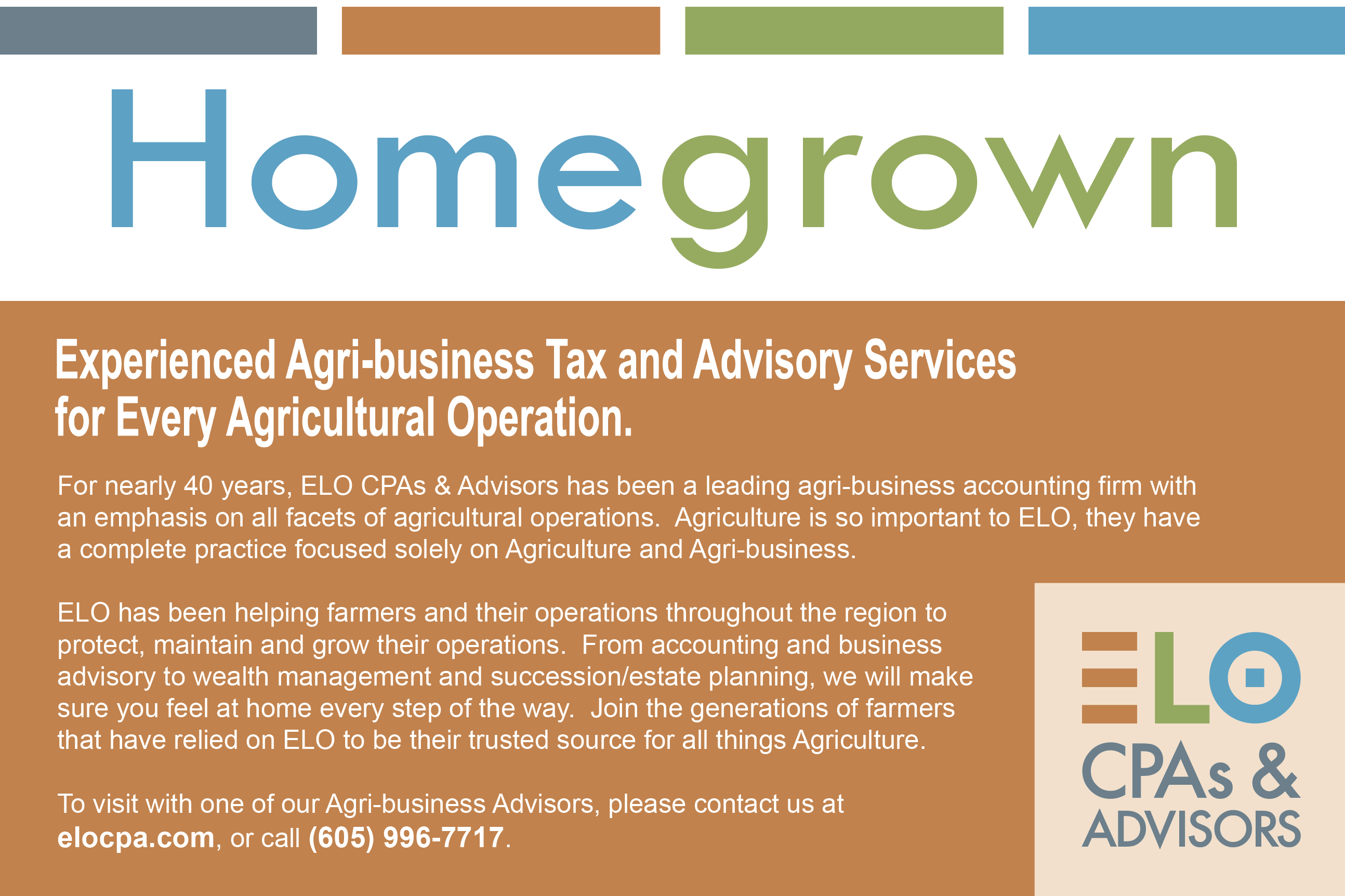
This piece first appeared in the Modern Producer Magazine - Special Thanks to ELO CPAs & Advisors for the article!
The business of farming has evolved over the years to grow in complexity which has enlisted the need for enhanced planning, sophistication, and advisory services. As the amount of capital at stake in farming operations has continued to increase, so has the need for a team of advisors. At ELO CPAs and Advisors, we have an entire practice that specializes in Agriculture and seeks to partner with their clients to provide a holistic business approach to fulfill the farm’s financial, succession, accounting, and tax needs. To be successful, the whole picture must be considered, and it takes a team of advisors to accomplish this.
In this article, ELO’s Agri-business team will discuss three items that they work with and feel play an important part in the success of a farming operation. These items are Farm Business Accounting, Agricultural Research & Development Tax Credits, and Estate & Succession Planning. Accounting is referred to as the language of business and can be leveraged to make decisions to set the operation up for success in the challenging and cyclical nature of farming. Every year is a challenge and an experiment of its own, in the agricultural world, with an impressive amount of technology and innovation continuing to be used. Agricultural Research & Development credits can assist operations through financial incentives in the form of income tax credits for the things they are doing to continue improving every year. Lastly, we will place an emphasis on the importance of Estate and Succession planning to successfully carry-on the farm’s legacy in an ever-changing political, legal, and tax environment.

Farm Business Accounting
While Accounting is the language of business; on the farm, Accounting is often a neglected job. Proper accounting is the oil to your farm’s financial engine. There are hundreds of thousands, if not millions, of dollars flowing through the farm’s account each year, yet there is a simple question that goes unanswered “Did the operation make money last year?”. This cannot be determined by simply looking at the balance in the checkbook. Accounting will show the health and capacity of the farm’s financial engine.
Most farms keep their accounting on the cash basis of accounting because that is how the Schedule F on the tax return is reported. This means that income is recorded as deposits are made and expenses are recorded when checks written. If the deposits made are greater than checks written, an operation made money that year, right? This is not always the case.
Let’s look at how deposits and checks flow through in a crop year. Often, the farm is collecting income and writing checks that cover three crop cycles. For example, in 2021, operations had likely sold 2020 and/or 2021 crop, paid for 2021 overhead expenses such as insurance, repairs, utilities, and paid for 2022 crop inputs such as seed, chemical, and fertilizer. Couple this with the fact that an operation’s revenue fluctuates daily with changes in grain and livestock prices – accounting on the farm is far more complex than it is credited for. Honestly, it is more complicated than almost every business due to the constant fluctuations of input costs, output value and the inconsistent flow of those expenses and revenues. So, what’s the answer?
Accrual Accounting is the answer to this problem. To describe it simply, accrual accounting is the way an operation thinks about the “how was the farm’s year?”. If an operation completed harvest after harvesting a record crop with a profitable price, they would say it was the best year on record. At the end of the year though, why don’t the financial statements reflect that success? That begs the question, what good is an accounting system if it cannot answer the simple question - “Did we make money this year?”
Moving to an accrual basis is the first step for an operation to allow its accounting system to start paying dividends for the farm. Accrual accounting transforms your accounting system from a purely compliance tracking system to a managerial tool that increases visibility that allows an operation to make more informed decisions to drive profitability as well as manage the farm’s balance sheet through the cyclical nature of agriculture. It answers these simple yet complex questions:
- “Are we profitable?”
- “Which crops are making us money?”
- “Are we in a good working capital position?”
- “Are we cash-flowing enough to cover our debt payments?”
- “Should we take on that ground at that price?”
- “Where would our profits be best re-invested into?”
- “Is our balance sheet ready for the next downturn in the farm economy?”
Getting your accounting system moved from cash to accrual accounting can be a tough task for those unfamiliar with the structure and process. Working with a trusted ELO Agri-business advisor that not only understands accounting, but also understands the business of farming, is critical to your success. An Agri-business advisor can be much more than just someone to manage your taxes, they can understand everything you go through as a farmer. They can be a key business partner to help provide you with accurate financial information that drives decision making in your operation. The Agri-business team at ELO can provide you with full-service accounting, tax and assistance with financial matters that range from A-Z.

Agricultural Research & Development Credits
Much of the recent buzz around agricultural credits centers around carbon credits. While these have significant potential in the future, an incentive that your farm likely isn’t taking advantage of currently is the Research & Development income tax credit. The Research & Development credit is an incentive in the U.S. tax code that allows operations to keep more of the dollars that are made by rewarding them for innovations and decisions that are already make on a daily basis. This credit can amount to significant tax savings for your farm (potentially hundreds of thousands of tax credits) and can be a tool for your farm’s strategic tax plan for years to come.
If your farm is continually improving and looking for the best ways and products to increase crop yield, improve soil health, herd health, and rate of gain, you likely qualify for the research and development credit. It is as simple as trying a new corn hybrid, trying a new soybean trait package such as Enlist or XtendFlex soybeans, or adding DDGs to your feed ration for the first time. The costs associated with purchasing the new seed, chemistries, feed, etc. can be attributed towards the calculation of your research and development credit. Most of the producers we work with are surprised that they qualify for this incentive because these are decisions, they are already making on a regular basis to improve their operations. These changes on the farm cost a significant amount of dollars and this credit can help reduce the cost of those changes.
Like all things in the tax code, this credit is nuanced and complex. It takes a partner to be able to navigate the regulations and maximize the dollars for your operation. ELO CPAs and Advisors has helped operations keep more of their profits and can be your partner to get your farm started in the Research & Development Credit.
 Estate & Succession
Estate & Succession
Passing on a farm is difficult. A study conducted by the University of Ohio State, titled Number of Generations a Farm has been in a Family, indicated the following stats regarding the composition of generational farms:
- 36% - 1st Generation Farm
- 25% - 2nd Generation Farm
- 25% - 3rd Generation Farm
- 10% - 4th Generation Farm
- 3% - 5th Generation Farm
- 1% - 6th Generation Farm
As the old adage says about family businesses, “the first generation makes it, second generation maintains it, and the third generation loses it.” As you can see, this saying may ring true in farming as passing a farm through the generations is extremely difficult. If succession planning is left up to chance, it is likely your farm will become a statistic. Intentional effort and planning are an absolute necessity for generational success.
You’ve successfully navigated the challenges that farming brings, you want to pass on a viable business to the next generation, but how do you do that in a changing political, legal, and tax environment? The first step is assembling your team of farm advisors that range from your CPA, lawyer, consultant, lender, and business advisor to navigate the challenges of farm succession planning. This team approach allows each advisor to work in unison in their area of expertise to develop a plan that best suits your farm. Each farm is unique and the tools needed to navigate a challenge successfully are different for each farm.
The average age of a farmer in the U.S. is 57.5 years old and a successful succession plan takes years to effectively implement. Don’t wait to contact your advisors to get the process started.
In closing, farming is an extremely rewarding business and way of life. There’s a saying that if you treat the farm like a business, it’s a wonderful way of life. If you treat it like a way of life, it’s a terrible business. Implementing tools that put an emphasis on financial stability can increase the odds that there is a viable and profitable operation to pass on to the next generation. Farming is not easy, nor is the business of farming, assembling your team of advisors will help ensure your family farm’s legacy and success.






